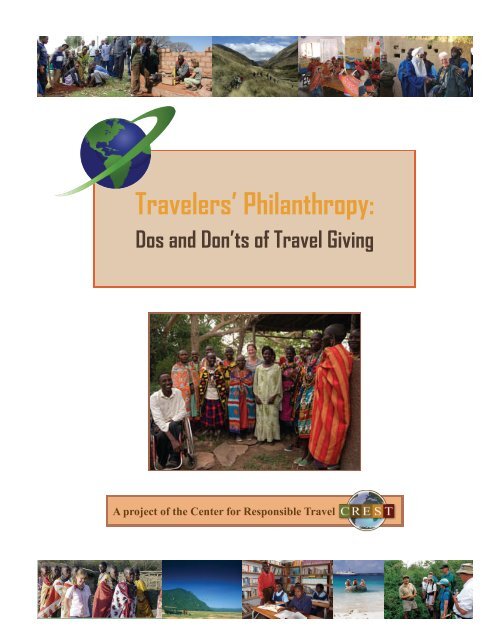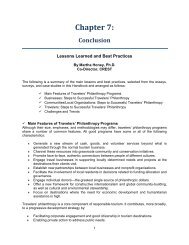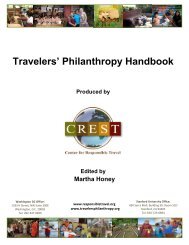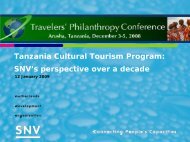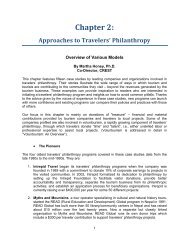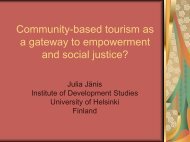Travelers' Philanthropy: Dos and Don'ts of Travel Giving - Center for ...
Travelers' Philanthropy: Dos and Don'ts of Travel Giving - Center for ...
Travelers' Philanthropy: Dos and Don'ts of Travel Giving - Center for ...
Create successful ePaper yourself
Turn your PDF publications into a flip-book with our unique Google optimized e-Paper software.
3When visitors suggest:“Let’s send books.”Experts respond:“If this is an identified need that has emerged from consultation <strong>and</strong> can be routed through thedevelopment practitioner, then great. But as a principle, all donations <strong>of</strong> product are very tough toapply without creating dependency.”“In 90% <strong>of</strong> cases, people send books in English, which is not helpful.”“Purchasing books in a local language is an effective way to ensure a donation will be used well.”“It’s important to buy locally to support the local economy <strong>and</strong> get books that are appropriate.”“If you are thinking <strong>of</strong> sending books, first consider:Is the shipping cost, customs fees <strong>and</strong> port taxes on arrival <strong>and</strong> further transport to thedestination going to outweigh the value <strong>of</strong> the books?Do you have a person on the ground who can ensure they clear customs <strong>and</strong> reachtheir destination?In what state are the books? If they are outdated, damaged or irrelevant, they will justadd to a trash problem.Is the in<strong>for</strong>mation culturally relevant <strong>and</strong> useful? A rural school in the tropics withoutelectricity doesn't need books on microwave cooking or ice-skating.”“An alternative would be to sell your used books <strong>and</strong> donate the money to a program thatpurchases new books <strong>for</strong> schools <strong>and</strong> libraries in developing countries.”Positive Approach:Myths & MountainsREAD Global Program, Nepal & IndiaIn partnership with rural Himalayanvillages, READ establishes librarycommunitycenters that grow into hubs<strong>of</strong> education <strong>and</strong> enterprise <strong>and</strong> act ascatalysts <strong>for</strong> economic <strong>and</strong> socialdevelopment <strong>for</strong> these communities.Global Village Foundation, GoPhilanthropic, Vietnam
4When visitors suggest:“Let’s visit an orphanage, school, or health clinic.”Experts respond:“Great – more than welcome to – though make sure yourintention is not to st<strong>and</strong> at arms length <strong>and</strong> ogle, to engagein ‘poverty tourism.’ Do not bring your binoculars, <strong>and</strong>ensure that respectful leadership is provided by a localperson. Ensure that you carry the energy <strong>of</strong> a visitor, notas someone who possesses power over another because<strong>of</strong> the material things you have.”“Visits should only be undertaken with prior arrangementthrough your tour operator or through a local person inappropriate authority who can arrange a suitably managedopportunity.”Global Village Foundation,GoPhilanthropic, Vietnam“Children are not pets. Orphanages are not zoos. Unless the visitor is giving a skill toa place, interacting with kids needs to be monitored <strong>and</strong> shouldn’t be happening on aregular basis.”“We only allow this if there’s some sort <strong>of</strong> contribution the guests are making to theorphanage <strong>and</strong> the children, <strong>and</strong> it’s not just going <strong>and</strong> looking.”Positive Approach: Micato Safari’s AmericaShare project educatesvisitors about the HIV/AIDS epidemic <strong>and</strong> provides support <strong>for</strong> affectedwomen <strong>and</strong> children, in the <strong>for</strong>m <strong>of</strong> school sponsorship programs,shelters, <strong>and</strong> community centers.“We endeavor to prepare our guests not only about the wildlife inAfrica but about life in Africa. After providing them with a richbackground on politics, culture <strong>and</strong> social structures in Africa,we take our guests to see the projects <strong>of</strong> our non-pr<strong>of</strong>it arm,AmericaShare. After a visit, many guests are moved to help.And through AmericaShare’s programs, they can.”Dennis Pinto, Managing Director, Micato Safaris, New YorkAmericaShare Project,Kenya
8When visitors ask:“Should I bring small gifts (pens, trinkets, c<strong>and</strong>y, or other items)to give to local children?”Experts respond:“Definitely not c<strong>and</strong>y – responsible <strong>for</strong> radical rise in tooth decay in communitiesaround Mara <strong>and</strong> Serengeti [in East Africa].”“My recommendation is not to. I’ve seen many communities where children startflocking around tourists because they can get c<strong>and</strong>y. Better to give somethingmeaningful to an institution.”“Well meaning gifts outside <strong>of</strong> a relationship result in loss <strong>of</strong> dignity to bothsides.”“In many cultures it is tradition to bring a gift as a gesture <strong>of</strong> gratitude <strong>for</strong>hospitality such as when you are a guest in someone's home. This may take the<strong>for</strong>m <strong>of</strong> a small useful household item, a souvenir <strong>of</strong> your country, or food suchas fresh fruit. But generally wewould advise against giving itemsdirectly to children, particularly if youare just engaging with them <strong>for</strong> ashort time.”“Indiscriminate giving by tourists canactually lead to children skippingschool or being encouraged by theirparents to take to the streets <strong>and</strong>beg. Do not give c<strong>and</strong>y or sweets asin many communities there isinadequate dental care <strong>and</strong>malnutrition.”Sign posted on an East African tourism truck,courtesy <strong>of</strong> Jane CrouchWhen visitors ask:“Should I give anything (money, food, etc.) to street beggars?”Experts respond:“This question is a tough one. We usually say to our visitors that its best to supportorganizations that work directly with beggars or street kids, or educational <strong>and</strong> capacity buildingprograms that assist people so they won’t end up on street.”“<strong>Giving</strong> gifts in an arbitrary way <strong>of</strong>ten turns the people in a destination into beggars, who seeWestern travelers only as people who give them things.”“<strong>Giving</strong> directly to an individual can give you an immediate feeling <strong>of</strong> pleasure or pride, butconsider whether you are really helping or purchasing gratitude. It can be difficult to refrainfrom giving to what appears to be really needy cases – such is our human nature. It is good toget local advice on what welfare services there are, particularly supporting people withdisabilities <strong>and</strong> the elderly. If begging is their only option <strong>for</strong> survival then you may chooseto give.”
9When visitors ask:“Should I help local children earn a bit <strong>of</strong> money byletting them carry bags or serve as my guide?”Experts respond:“No, those children should be in school! Instead, travelers should support community initiatives that areworking to get the children <strong>of</strong>f the street <strong>and</strong> into school.”“It’s okay to do so if it is part <strong>of</strong> a structured relationship or agreement.”“Depends on the situation. Always consult local tour guides first to see what is the right thing to do inthat area.”Positive Approach:Juan Carlos [Yanez] is exemplary <strong>of</strong> a local guide who is truly invested ina community-based project. He was a key figure in establishing thePatacancha Dormitory Project which provides housing <strong>and</strong> educationalinfrastructure <strong>for</strong> Peruvian students who would otherwise face anunmanageable daily commute to school. Juan Carlos isan excellent ambassador <strong>for</strong> Patacancha, regularly bringing travelers tothe community <strong>and</strong> even inspiring them to contribute donations.”Sonya Bradley, Responsible Tourism Program, Country WalkersWhen visitors ask:“What do I do when I take a photograph <strong>of</strong>someone <strong>and</strong> they ask me <strong>for</strong> money in return?”Experts respond:The advice <strong>of</strong> those surveyed is:• Ask in advance.• If you have already taken the photo, <strong>and</strong> they dem<strong>and</strong> payment, pay.• If you ask be<strong>for</strong>eh<strong>and</strong>, <strong>and</strong> they require payment, only pay if it is an <strong>of</strong>ficial transaction <strong>and</strong>a fair price.“I don’t think it’s an appropriate transaction to take a photo <strong>of</strong>someone <strong>and</strong> then give them money in return because itmay feed into the h<strong>and</strong>out problem.”“It is important to interact with the person first <strong>and</strong>always ask their permission be<strong>for</strong>e photographing orvideoing. If they ask <strong>for</strong> money be<strong>for</strong>eh<strong>and</strong>, which is theirprerogative, consider what it is worth to you <strong>and</strong> negotiate afair price, or do not take the picture. If they ask <strong>for</strong> moneyafter they agreed to be photographed <strong>and</strong> you have takenthe picture, then <strong>of</strong>fer what you think is appropriate. Byapproaching people in a friendly communicativemanner they are more likely to be agreeable <strong>and</strong> allow you amemorable photo.”<strong>Travel</strong>er interacts with local children,Intrepid <strong>Travel</strong>, India
10“<strong>Giving</strong> Time, Talent <strong>and</strong> Treasure”The first ever documentary on<strong>Travel</strong>ers’ <strong>Philanthropy</strong>This 25 minute film examines the challenges inherent insuccessful philanthropic projects <strong>and</strong> showcases examples <strong>of</strong><strong>Travel</strong>ers’ <strong>Philanthropy</strong> in Costa Rica, Tanzania <strong>and</strong> Kenya.It includes interviews with experts, tourism operators <strong>and</strong>community leaders. This impressive documentary was shot,edited, <strong>and</strong> produced by two talented young filmmakers fromStan<strong>for</strong>d University, Peter Jordan <strong>and</strong> Charlene Music. Weare grateful to ProParques <strong>and</strong> Basecamp Foundation <strong>for</strong>underwriting the production cost.To preview a clip <strong>of</strong> the film, go to:http://www.travelersphilanthropy.org/resources/film.shtmlTourism Enterprises:Grow your impact!2008 <strong>Travel</strong>ers’ <strong>Philanthropy</strong> ConferenceConference proceedings are available <strong>and</strong> include clips<strong>and</strong> transcripts from keynote speeches as well as allpresentations from panel speakers.www.travelersphilanthropyconference.orgIncrease benefits <strong>for</strong> the community-based projects you support byjoining the <strong>Travel</strong>ers’ <strong>Philanthropy</strong>network.For more in<strong>for</strong>mation on how tobecome a partner organization,visit:www.travelersphilanthropy.orgTo purchase a copy <strong>of</strong> the film (US $15) or<strong>Travel</strong>ers’ <strong>Philanthropy</strong> Conference proceedings (US $15),please contact:Whitney Cooperwcooper@responsibletravel.org(202) 347-9203 ext. 414
11This is the first <strong>of</strong> a series <strong>of</strong> publications that will be collected into the<strong>for</strong>thcoming <strong>Travel</strong>ers’ <strong>Philanthropy</strong> H<strong>and</strong>book to be released at theThis is the firstWorld<strong>of</strong><strong>Travel</strong>a seriesMarket<strong>of</strong>inpublicationsLondon in Novemberthat will2009.be collectedinto the <strong>for</strong>thcoming <strong>Travel</strong>ers’ <strong>Philanthropy</strong> H<strong>and</strong>book to bereleased Those at the who World gave us <strong>Travel</strong> answers Market <strong>and</strong> insights <strong>for</strong> London this survey in are: November2009.&Beyond (Les Carlisle)www.<strong>and</strong>beyondafrica.comThose who gave us answers <strong>and</strong> insights <strong>for</strong> this survey are:The African Safari Lodge Foundation (S<strong>and</strong>ra Mombelli)www.asl-foundation.orgThe Africa Safari Lodge Foundation (S<strong>and</strong>ra Mombelli)Country Walkers (Sonya Bradley)Dorobo Safaris (Daudi Peterson)Global Exchange (Malia Everette)Global Sojourns (Priscilla Macy)Go Philanthropic (Lydia Dean)Holbrook <strong>Travel</strong> (Andrea Holbrook)Intrepid <strong>Travel</strong> (Jane Crouch)Micato Safaris (Dennis Pinto)Myths & Mountains (Carol Erickson)Pepy (Daniella Papi)Country Walkers (Sonya Bradley)www.countrywalkers.comDorobo Safaris (Daudi Peterson)Global Exchange-Reality Tours (Malia Everette)www.globalexchange.orgGlobal Sojourns (Priscilla Macy)www.globalsojourns.comGoPhilanthropic (Lydia Dean)www.gophilanthropic.comHolbrook <strong>Travel</strong> (Andrea Holbrook)www.holbrooktravel.comIntrepid <strong>Travel</strong> (Jane Crouch)www.intrepidtravel.comMicato Safaris (Dennis Pinto)www.micato.comREAD Global (Carol Erickson)We thank especially Jane Crouch <strong>and</strong> Priscilla Macy <strong>for</strong> proposingwww. readglobal.orgPepy Toursthis(Daniellasurvey,Papi)<strong>and</strong> Bethany Wylie <strong>and</strong> Johanna Contreraswith www.pepytours.com CREST <strong>for</strong> conducting the interviews, compiling the results,<strong>and</strong> designing this publication.Photos were also provided by: Global Village Foundation- Vietnam, Journeys within OurCommunity-Cambodia, Nature Kids Foundation-Costa Rica, PatacanchaA more in-depth summary <strong>of</strong> the responses to this survey isCommunity Project- Peru, <strong>and</strong> Yachana Foundation- Ecuador.available online at: www.travelersphilanthropy.org. We inviteWe your thank additions especially <strong>and</strong> Jane suggestions Crouch <strong>and</strong> Priscilla as well. Macy Please <strong>for</strong> proposing send this to: survey, ??? <strong>and</strong>Bethany Wylie <strong>and</strong> Johanna Contreras with CREST <strong>for</strong> conducting the interviews,compiling the results, <strong>and</strong> designing this publication. We thank also Anna Marzsal <strong>for</strong>her help with the layout <strong>and</strong> design.A more in-depth summary <strong>of</strong> the responses to this survey as well as a condensed“bookmark” version is available online at: www.travelersphilanthropy.org. We invite youradditions <strong>and</strong> suggestions as well. Please send to: ldriscoll@responsibletravel.org
12<strong>Center</strong> on Ecotourism <strong>and</strong> Sustainable Developmenthas changed its name <strong>and</strong> is now<strong>Center</strong> <strong>for</strong> Responsible <strong>Travel</strong>.Trans<strong>for</strong>ming the way the world travels.<strong>Travel</strong>ers’ <strong>Philanthropy</strong>A project <strong>of</strong> the <strong>Center</strong> <strong>for</strong> Responsible <strong>Travel</strong>www.travelersphilanthropy.org<strong>Center</strong> <strong>for</strong> Responsible <strong>Travel</strong>Washington, DC Office1333 H St. NW,Suite 300, East TowerWashington, DC 20005Tel: 202‐347‐9203Stan<strong>for</strong>d Office450 Serra MallBuilding 50 Room 51D,Stan<strong>for</strong>d, CA 94305Tel: 650‐723‐0894Email: staff@responsibletravel.orgWebsites: www.travelersphilanthropy.org & www.responsibletravel.org


